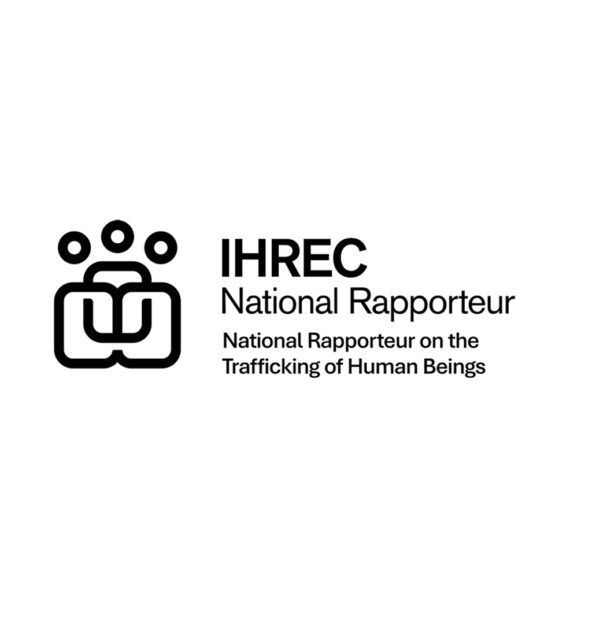What is Human Trafficking?
Human trafficking is a serious and heinous human rights violation. It is deeply gendered and racialised.
The EU Directive defines Human Trafficking as:
[Action]
The recruitment, transportation, transfer, harbouring or reception of persons, including the exchange or transfer of control over those persons,
[Means]
by means of the threat or use of force or other forms of coercion, of abduction, of fraud, of deception, of the abuse of power or of a position of vulnerability or of the giving or receiving of payments or benefits to achieve the consent of a person having control over another person, for the purpose of exploitation.
[Exploitation]
Exploitation shall include, as a minimum, the exploitation of the prostitution of others or other forms of sexual exploitation, forced labour or services, including begging, slavery or practices similar to slavery, servitude, or the exploitation of criminal activities, or the removal of organs, or the exploitation of surrogacy, of forced marriage, or of illegal adoption.’
- The consent of a victim of trafficking in human beings to the exploitation, whether intended or actual, shall be irrelevant where any of the ‘means’ has been used.
- When the conduct involves a child, it shall be a punishable offence of trafficking in human beings even if none of the ‘means’ has been used.
- A ‘position of vulnerability’ means a situation in which the person concerned has no real or acceptable alternative but to submit to the abuse involved.
Human Trafficking in Ireland
Ireland is not immune to trafficking.
Year after year, the experiences of front-line responders, the accounts of victims, and the data itself clearly shows that human trafficking crimes are being committed in Ireland, and people are being exploited for profit.
Trafficking in human beings in Ireland remains a hidden but common crime. The true extent of human trafficking in Ireland is likely much higher than official statistics report. This is partly due to issues around identifying victims.
Who is responsible for co-ordinating Ireland's anti-trafficking response?
In Ireland, the Minister for Justice is responsible for the coordination of the States anti-trafficking response.
This means that the Department of Justice is the National Anti-Trafficking Coordinator. An important aspect of that role is ensuring that relevant State departments, agencies and bodies fulfil their obligations as part of the overall implementation of the EU Anti-trafficking Directive.
The Department of Justice dedicated Anti-Human Trafficking website, Blueblindfold has information on a range of State, international, and community and voluntary organisations working to provide support services for people affected by Human Trafficking.
The Irish Human Rights and Equality Commission is the National Rapporteur on the Trafficking of Human Beings.
Independent National Rapporteur on the Trafficking of Human Beings
In October 2020, the Irish Human Rights and Equality Commission became Ireland’s Independent National Rapporteur on the Trafficking of Human Beings.
Our job as Ireland’s Independent National Rapporteur on Human Trafficking is to:
- assess trends in trafficking in human beings;
- measure the results of anti-trafficking actions;
- gather statistics (including in cooperation with relevant civil society organisations); and
- report.
Survivor engagement is essential to our work as National Rapporteur.

How are we fulfilling that role?
Our values are underpinned by a holistic, equality, human rights, victim-centred, gender-, disability- and child-sensitive approach to addressing human trafficking.
As National Rapporteur, we prepare and publish monitoring reports and thematic reports evaluating Ireland’s overall performance against the State’s international obligations such as the EU’s Anti-Trafficking Directive, the Council of Europe’s Convention on Action against Trafficking (2005) and the UN Palermo Protocol – Protocol to Prevent, Suppress and Punish Trafficking in Persons Especially Women and Children (2000), supplementing the United Nations Convention against Transnational Organized Crime.
We also prepare Independent Reports of State action, to align with international monitoring in this area. Our reporting provides a strong and credible baseline for external evaluations. We also contribute to the development of the research and evidence base required to underpin effective monitoring and policy development.
What is the law in Ireland?
The primary statutes that give effect to Ireland’s international obligations to combat human trafficking are the Criminal Law (Sexual Offences and Human Trafficking) Act 2024 the Child Trafficking and Pornography Act 1998 and the Criminal Law (Human Trafficking) Act 2008.
The Human Trafficking Act 2008 was subsequently amended in 2013 by the Criminal Law (Human Trafficking) Amendment Act 2013 to include forced begging and forced engagement in criminal activities as new forms of trafficking.
Additionally, other statutes containing trafficking-related offences are particularly important to consider in the overall human trafficking response.
How is Human Trafficking monitored internationally?
- US Department of State Trafficking in Persons Report
monitoring the implementation of UN Palermo Protocol (Protocol to Prevent, Suppress and Punish Trafficking in Persons Especially Women and Children, supplementing the United Nations Convention against Transnational Organized Crime) - Council of Europe Group of Experts on Action against Trafficking in Human Beings (GRETA) is responsible for monitoring the implementation of the Council of Europe Convention on Action against Trafficking in Human Beings.
GRETA Third Evaluation Report on Ireland - Directive (EU) 2024/1712 of the European Parliament and of the Council of 13 June 2024 amending Directive 2011/36/EU on preventing and combating trafficking in human beings and protecting its victims
- Directive (EU) 2011/36 of the European Parliament and of the Council of 5 April 2011 on preventing and combating trafficking in human beings and protecting its victims, and replacing Council Framework Decision 2002/629/JHA
- OSCE’s Office of the Special Representative and Co-ordinator for Combatting Trafficking in Human Beings
